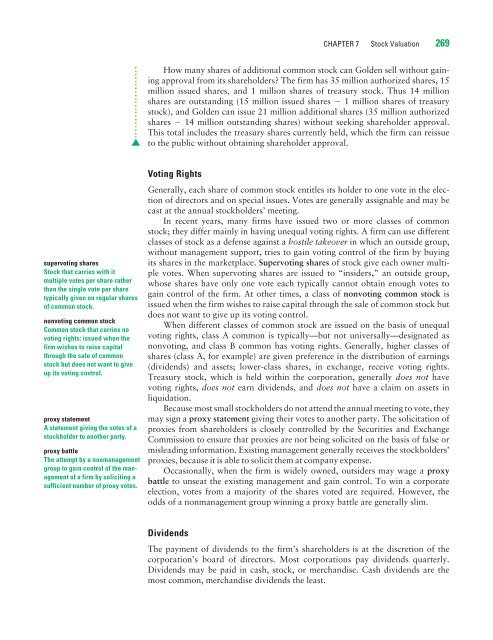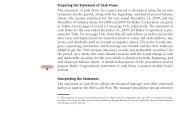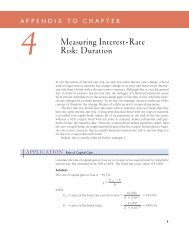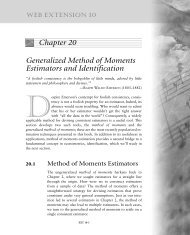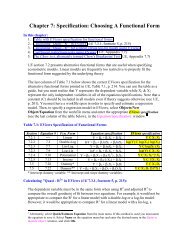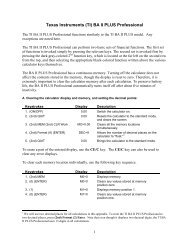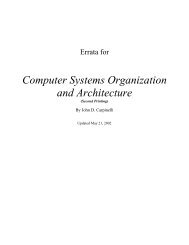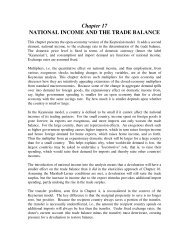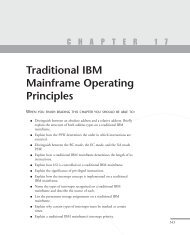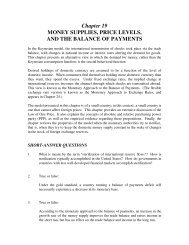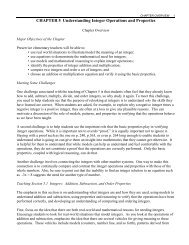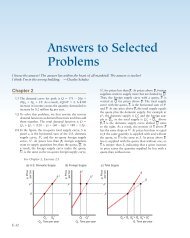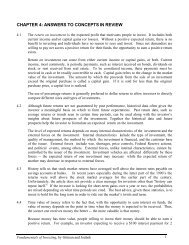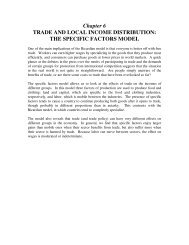Stock Valuation
Stock Valuation
Stock Valuation
You also want an ePaper? Increase the reach of your titles
YUMPU automatically turns print PDFs into web optimized ePapers that Google loves.
supervoting shares<br />
<strong>Stock</strong> that carries with it<br />
multiple votes per share rather<br />
than the single vote per share<br />
typically given on regular shares<br />
of common stock.<br />
nonvoting common stock<br />
Common stock that carries no<br />
voting rights; issued when the<br />
firm wishes to raise capital<br />
through the sale of common<br />
stock but does not want to give<br />
up its voting control.<br />
proxy statement<br />
A statement giving the votes of a<br />
stockholder to another party.<br />
proxy battle<br />
The attempt by a nonmanagement<br />
group to gain control of the management<br />
of a firm by soliciting a<br />
sufficient number of proxy votes.<br />
CHAPTER 7 <strong>Stock</strong> <strong>Valuation</strong> 269<br />
How many shares of additional common stock can Golden sell without gaining<br />
approval from its shareholders? The firm has 35 million authorized shares, 15<br />
million issued shares, and 1 million shares of treasury stock. Thus 14 million<br />
shares are outstanding (15 million issued shares 1 million shares of treasury<br />
stock), and Golden can issue 21 million additional shares (35 million authorized<br />
shares 14 million outstanding shares) without seeking shareholder approval.<br />
This total includes the treasury shares currently held, which the firm can reissue<br />
to the public without obtaining shareholder approval.<br />
Voting Rights<br />
Generally, each share of common stock entitles its holder to one vote in the election<br />
of directors and on special issues. Votes are generally assignable and may be<br />
cast at the annual stockholders’ meeting.<br />
In recent years, many firms have issued two or more classes of common<br />
stock; they differ mainly in having unequal voting rights. A firm can use different<br />
classes of stock as a defense against a hostile takeover in which an outside group,<br />
without management support, tries to gain voting control of the firm by buying<br />
its shares in the marketplace. Supervoting shares of stock give each owner multiple<br />
votes. When supervoting shares are issued to “insiders,” an outside group,<br />
whose shares have only one vote each typically cannot obtain enough votes to<br />
gain control of the firm. At other times, a class of nonvoting common stock is<br />
issued when the firm wishes to raise capital through the sale of common stock but<br />
does not want to give up its voting control.<br />
When different classes of common stock are issued on the basis of unequal<br />
voting rights, class A common is typically—but not universally—designated as<br />
nonvoting, and class B common has voting rights. Generally, higher classes of<br />
shares (class A, for example) are given preference in the distribution of earnings<br />
(dividends) and assets; lower-class shares, in exchange, receive voting rights.<br />
Treasury stock, which is held within the corporation, generally does not have<br />
voting rights, does not earn dividends, and does not have a claim on assets in<br />
liquidation.<br />
Because most small stockholders do not attend the annual meeting to vote, they<br />
may sign a proxy statement giving their votes to another party. The solicitation of<br />
proxies from shareholders is closely controlled by the Securities and Exchange<br />
Commission to ensure that proxies are not being solicited on the basis of false or<br />
misleading information. Existing management generally receives the stockholders’<br />
proxies, because it is able to solicit them at company expense.<br />
Occasionally, when the firm is widely owned, outsiders may wage a proxy<br />
battle to unseat the existing management and gain control. To win a corporate<br />
election, votes from a majority of the shares voted are required. However, the<br />
odds of a nonmanagement group winning a proxy battle are generally slim.<br />
Dividends<br />
The payment of dividends to the firm’s shareholders is at the discretion of the<br />
corporation’s board of directors. Most corporations pay dividends quarterly.<br />
Dividends may be paid in cash, stock, or merchandise. Cash dividends are the<br />
most common, merchandise dividends the least.


